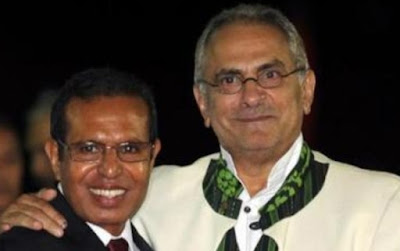Dili: The
front-runner in East Timor's presidential elections on Monday has offered new
hope for a breakthrough in a
bitter stand-off with Australia over $40 billion in oil and gas
fields.
Francisco
Guterres, known as Lu-Olo, told Fairfax Media there are now "better
prospects" for an agreement on sea borders which could lead to an
agreement to develop the Greater Sunrise fields in the Timor Sea.
An
Australian parliamentary committee has been told that without billions of
dollars in revenue from the fields, Australia's neighbour is likely to become
an aid-dependent, failed state.
Mr
Guterres, a leading figure in the power-sharing Fretilin Party, left open the
possibility of the gas being piped to an existing plant in Darwin or
for a floating platform to extract it above the fields.
Xanana
Gusmao, East Timor's independence hero, has for years demanded that the
gas be piped to a proposed $1.4 billion industrial complex on the country's
remote southern coast, despite a
consortium led by Woodside Petroleum saying that this approach was
unviable and shelving the project.
"I
can't guess what the outcome will be. Each side has a position. That is what we
will take to the table," Mr Guterres said, referring to negotiations on a
new sea border by a September deadline.
In
January, East
Timor dropped a spying case against Australia in the
international court and issued a joint statement
with Canberra pledging to negotiate the sea borders "in good
faith".
Rebecca
Strating, an expert on East Timor from Victoria's La Trobe University,
told a parliamentary committee last week it is "very
possible" East Timor could be the "architect of its own
demise" as revenues from its existing oil and gas resources and a sovereign
wealth fund are exhausted.
"There
are elections this year. A change in government or a change in personalities
might produce a government that is willing to think a little more laterally or
flexibly around the interests in the Timor Sea," Dr Strating said.
"But
since 2012 it seems to me that this pursuit of independence may actually create
a failed state in Timor-Leste [East Timor]," she said.
East
Timor, which has failed to diversify its income to manufacturing or
agriculture, relies on oil and gas revenues for more than 90 per cent of its $2
billion-a-year budget.
"The
next five years with new leadership is a critical time because
revenue from currently used oil fields is mostly depleted," said
Charles Scheiner of Lao Hamutuk,
a Dili-based think-tank.
Presidential
elections will be followed by general elections in July.
Mr
Guterres, a former guerrilla fighter, said he cannot see any of seven other
candidates beating him for the presidency, predicting he will win enough votes
to avoid a run-off election in April.
Mr
Gusmao, the country's behind-the-scenes powerbroker, swung his support behind
Mr Guterres and rejected a push for younger leaders to replace former
resistance fighters who have dominated the country's politics since
independence in 2002.
"Yes,
there is some opinion that younger leaders should be elected. But no way,"
Mr Gusmao told reporters.
"We
are not a perfect state … it is very early. That is why you have to trust
Lu-Olo to keep the country united," he said.
Antonio
da Conceicao, education minister from the Democratic Party, appears to be Mr
Guterres' closest rival, but analysts say his best chance would be in a
run-off.
Jose
Ramos Horta, the country's respected former president, prime minister and Nobel
laureate, decided in January not to contest the election, saying it is time for
generational renewal.
Electioneering
in Asia's youngest democracy has been largely violence-free but intense
amid persistent poverty and claims of entrenched corruption.
Twenty-six
observers have travelled from Australia for the election, the country's
first without United Nations support.
Damien
Kingsbury from Melbourne's Deakin University, who is leading the
delegation, said despite some technical issues he expects the voting will
proceed without any major hiccups.
East
Timor has been ruled since 2015 by a power-sharing executive made up of
leaders of Mr Gusmao's National Congress for Timorese Reconstruction (CNRT) and
Fretilin. The two groups had been bitter
rivals for years.
Clinton
Fernandes, a Timorese expert from the University of New South
Wales, said whoever Mr Gusmao endorses will win the elections.
"Voters
see the cash liquidity flowing through the economy and – crucially – they trust
Xanana," Professor Fernandes said.
"He's
lost weight and appears to be looking after his health – which to me means he's
probably intending to be a player well into his 80s."
Professor
Fernandes said the person Mr Gusmao endorses for prime minister later in the
year will have to have three qualities – connection to the public, ruthlessness
and magic.
"Xanana
is very much an animist and appears to believe his destiny and that of his
country are in the hands of the ancestors whose spirits influence the
land," he said.
Photo:
Francisco "Lu-Olo" Guterres: "Better prospects" for
agreement with Australia. Photo: Wayne Lovell

































